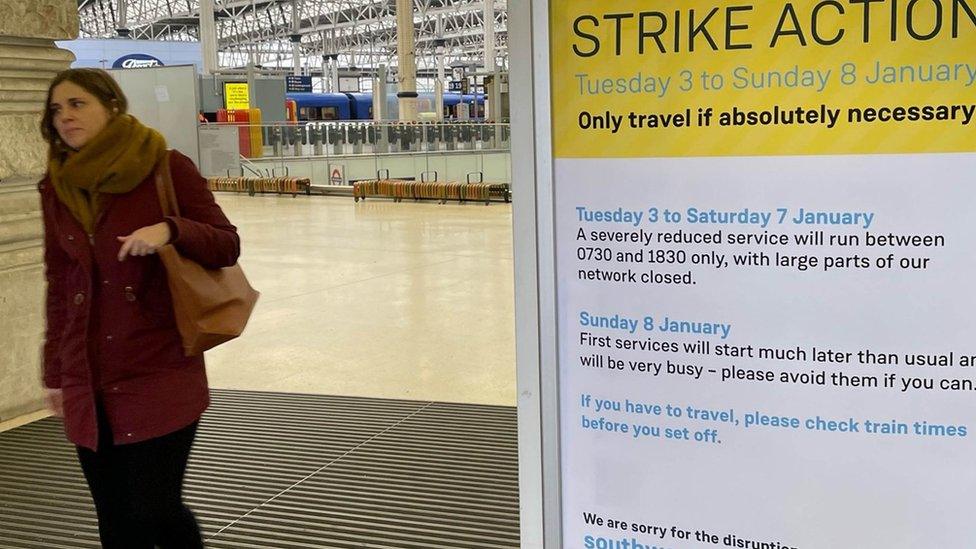Train strikes: Union boss warns action may continue for months
- Published

Train strikes could continue for months more, the boss of Britain's largest rail union has warned.
Mick Lynch said the RMT union, which began its latest walkouts on Tuesday, had a mandate to take action up until May, and could "go further".
People returning to work after the Christmas break have been urged to avoid travelling by rail this week because of strikes running to Saturday.
The action is over pay and conditions, but one party said a deal was close.
Mr Lynch apologised for the action "dragging on" but accused the government of "doing nothing" about the dispute.
He warned if there was no deal, then workers would continue to strike.
"We've got a mandate that runs through to May this year, and if we have to go further, that's what we'll need to do," he warned.
However, Network Rail, which owns and maintains the railways, claimed a deal was "within touching distance".
Boss Tim Shoveller urged the union to "sit down with us" and revisit the deal made before Christmas so it could "make clarifications" where elements of the deal had been "misunderstood".
The BBC understands a meeting is being arranged for Monday or Tuesday on the rail dispute.
Mr Lynch said the meeting would involve "all the actors including the rail minister".
It's understood the rail minister will also meet Aslef, the train drivers' union, early next week.
'I won't be paid as I can't get to work'

Corinne Curtis, from Somerset, said she supported the right to strike and did not "begrudge" the action, but said it meant she had lost the equivalent of a month's rent in earnings because she cannot get to work on strike days and is on a zero hours contract.
"How long it's going on for, it leads to accumulated stress and rage. The train is my only option and that's partly what is really frustrating, is knowing that I'm being held to ransom," she told the BBC.
Olga King who commutes to work in London from Surrey, said train users had to deal with "high ticket prices for a very poor service".
"The current train service is not fit for purpose and I don't support the train strikes as in order to strike they should at least provide a decent service which they don't," the 35-year-old said.
But Helen West, who has commuted to Chester from Lancaster said she had been "severely disrupted by the rail strikes", but added she had "solidarity" with the striking workers.
"I have overheard rail workers talk to each other about how exhausted they are - completing a shift and then being called in almost immediately afterwards due to staff shortages," she said.
Major disruption
This week's walkouts are the latest in a series of strikes across the rail network that have caused major disruption.
Some 40,000 RMT members employed by Network Rail and 14 train operators are holding two 48-hour strikes - on 3-4 and 6-7 January - after they rejected offers in a dispute over pay, job security and working conditions.
Train drivers in the Aslef union are striking at 15 rail companies on 5 January in a dispute over pay.
Services across England, Scotland and Wales are affected by the strikes. Network Rail said just 20% of services were running on Tuesday.
Trains that do run will start later and finish much earlier than usual, with services typically running between 7:30am and 6.30pm on strike days.
Talks 'torpedoed'
Both Network Rail and the Rail Delivery Group (RDG), which represents the train operating companies, have people only to travel if "absolutely necessary" due to services being cancelled and disrupted.
Mr Lynch insisted that his members wanted a settlement but said the government had "torpedoed" negotiations with rail companies, by "putting conditions into the documentation that they know we can never accept".
However, Transport Secretary Mark Harper said he had "made sure" there had been a new and improved offer put to trade unions, which two other unions had accepted.
"I would much rather they got off the picket line and got back round the negotiating table to hammer out a deal on reform and pay with the employers," he said.
Richard Burge, chief executive of the London Chamber of Commerce, told the Today programme the strikes would disrupt travel into the capital at the start of the new working year.
He said business owners were "blaming both" the government and unions for the strikes. He accused the unions of "exploiting the situation", but also added that the government was "sitting back and pretending they are not engaged in this discussion and they need to be".


The disruption caused by the rail strikes will cost the hospitality industry £2.5bn for the period from June to the end of this week, according to UK Hospitality boss Kate Nicholls.
This is £1bn more than the £1.5bn it had previously estimated, as an expected pre-Christmas bounce back during a period when fewer strikes were called never materialised and factors in the new strike dates called by rail workers this week.
Ms Nicholls, chief executive of UK Hospitality UK told the BBC that travel disruption was deterring customers from booking restaurants, shows, and other events in advance.
"People are booking at the last minute or not at all which makes it very hard for businesses to plan ahead," she said.

The rail industry is under pressure to save money after the pandemic left a hole in its finances. Bosses say reforms need to be agreed to afford pay increases and modernise the railway.
But unions say salaries should increase to reflect the rising cost of living.
Network Rail said it needs to make about 1,850 redundancies to reduce costs, but said it could guarantee no compulsory redundancies until 2025 as it had 3,000 volunteers.


Have you been affected by the current strikes? Share your experiences by emailing haveyoursay@bbc.co.uk, external.
Please include a contact number if you are willing to speak to a BBC journalist. You can also get in touch in the following ways:
WhatsApp: +44 7756 165803
Tweet: @BBC_HaveYourSay, external
Please read our terms & conditions and privacy policy
If you are reading this page and can't see the form you will need to visit the mobile version of the BBC website to submit your question or comment or you can email us at HaveYourSay@bbc.co.uk, external. Please include your name, age and location with any submission.

DATING DISASTERS: Audience members compete over terrible dating experiences
SNIFF TEST: Do 'clone' perfumes smell as good as the originals?

Related topics
- Published9 May 2024

- Published31 December 2022

- Published21 December 2022
